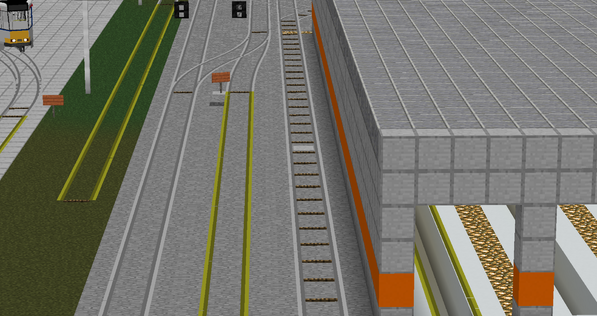Difference between revisions of "Rail Node Hell"
Views
Actions
Namespaces
Variants
Tools
m (Minor fix) |
m |
||
| (One intermediate revision by the same user not shown) | |||
| Line 3: | Line 3: | ||
Rail Node Hell usually refers the usage of an excessive amount of Rail Node. | Rail Node Hell usually refers the usage of an excessive amount of Rail Node. | ||
The most notable example of Rail Node Hell is the Depot Loop in [[Kansai APM Maintenance Centre]]. | The most notable example of Rail Node Hell is the Depot Loop in [[Kansai APM Maintenance Centre|Kansai APM Maintenance Center]]. | ||
[[File:Kansai APM Maintenance Center Loop Exit.png|none|thumb|481x481px|The loop exit in Kansai APM Maintenance Center, filled with rail node every few blocks, with construction workers remarking "jam line" before the jamming issue was resolved.]] | |||
== History == | == History == | ||
==== Root Cause ==== | ==== Root Cause ==== | ||
On June 2016, [[KCR]] has introduced a new Fixed Block Signaling system to improve safety of the ride. | On June 2016, [[KCR]] has introduced a new Fixed Block Signaling system to the [[Kansai APM|Kansai APM Network]] in order to improve safety of the ride. | ||
However due to the relatively short distances each train are required to achieve optimal train frequency, this causes extreme long waiting and journey time. | However due to the relatively short distances each train are required to achieve optimal train frequency, this causes extreme long waiting and journey time. | ||
| Line 19: | Line 18: | ||
It was later discovered that the problem is caused by the Depot Loop inside [[Kansai APM]], where almost all route has to go through in order to Enter/Exit the [[Kansai APM Maintenance Center]]. | It was later discovered that the problem is caused by the Depot Loop inside [[Kansai APM]], where almost all route has to go through in order to Enter/Exit the [[Kansai APM Maintenance Center]]. | ||
As an attempt to resolve the issue, frequency of trains | As an attempt to resolve the issue, frequency of trains was further lowered, but this happens again after 2 weeks. | ||
==== The solution ==== | ==== The solution ==== | ||
Latest revision as of 03:31, 20 June 2022
Notice
The topic of this article has not been fully confirmed by the respecting owner.
Rail Node Hell usually refers the usage of an excessive amount of Rail Node.
The most notable example of Rail Node Hell is the Depot Loop in Kansai APM Maintenance Center.
History
Root Cause
On June 2016, KCR has introduced a new Fixed Block Signaling system to the Kansai APM Network in order to improve safety of the ride.
However due to the relatively short distances each train are required to achieve optimal train frequency, this causes extreme long waiting and journey time.
On July 2016, one week after the operation of the new signaling system, Kansai APM has experienced a large jamming issues, where every train is interlocked with each other, jamming the entirety of the Kansai APM Network.
It was later discovered that the problem is caused by the Depot Loop inside Kansai APM, where almost all route has to go through in order to Enter/Exit the Kansai APM Maintenance Center.
As an attempt to resolve the issue, frequency of trains was further lowered, but this happens again after 2 weeks.
The solution
On September 2016, the issue was further investigated with Rigel Corp, and they came up with a solution by placing nodes every few blocks or so within the loop.
Despite the solution being very laughable and ridiculous, this effectively resolves any major interlocks on the network.

